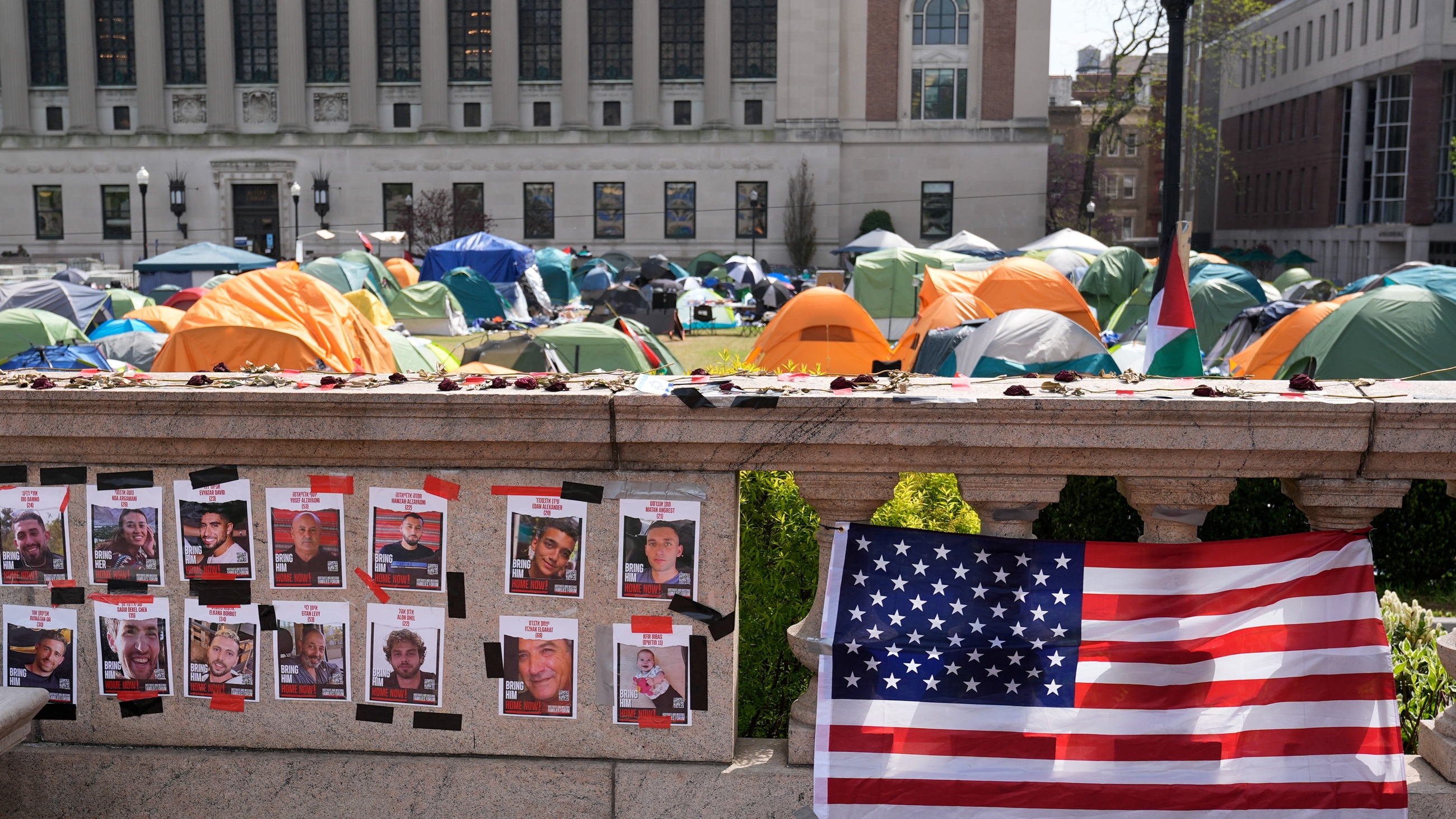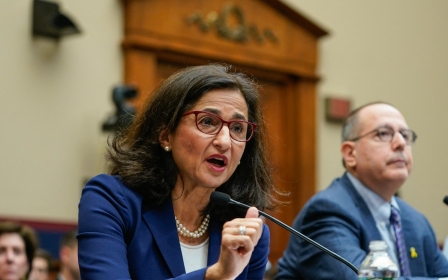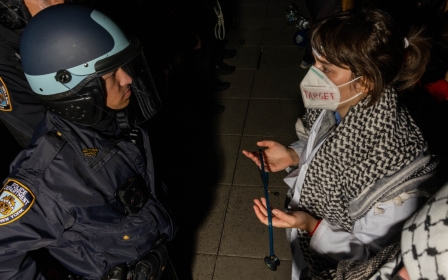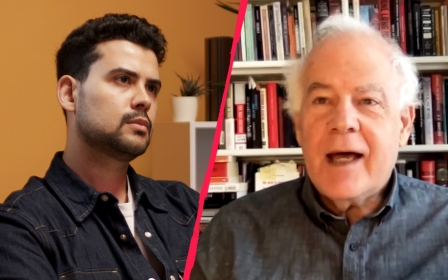'Extremely concerning': Pro-Palestinian students at Columbia and NYU face censorship as semester begins

As the fall semester begins across US campuses and Israel’s war on Gaza continues, universities have been proactive in their attempt to slow the momentum built by pro-Palestine student movements in the last academic year, doubling down on censoring criticism of Israel.
Simultaneously, Meta has increased pressure on accounts that feature pro-Palestine and anti-Israel content. In the past week, New York University and Columbia University students in New York City have faced pushback on both these fronts.
Both Columbia and NYU were home to heated standoffs between the administrations and pro-Palestinian protestors throughout the entirety of the 2023-2024 school year, culminating with their respective Gaza solidarity encampments and their eventual sweeps by the New York Police Department.
And online, both of the main pro-Palestine student organisations, Columbia Students for Justice in Palestine and NYU Palestine Solidarity Committee, have repeatedly been shadow-banned, flagged for review or temporarily suspended from Instagram since late 2023.
This week, on 25 August, Columbia SJP was permanently banned from Instagram with no reason provided and no opportunity to appeal. And only a couple of days later, NYU PSC’s account was suspended from Instagram as well.
New MEE newsletter: Jerusalem Dispatch
Sign up to get the latest insights and analysis on Israel-Palestine, alongside Turkey Unpacked and other MEE newsletters
These actions come in the wake of a new campaign, a collaboration between the Secure Community Network (SCN), a non-profit that aims to be " the official homeland security and safety initiative of the organized Jewish community in North America", and Hillel International – which focuses on fostering a relationship between Jewish Americans and the state of Israel.
The "Operation SecureOurCampuses" campaign is in response to "the increase in safety and security incidents stemming from antisemitic activity affecting Jewish students, faculty, and staff on university and college campuses," said the press release for the campaign's launch.
"'Operation SecureOurCampuses' will leverage SCN’s national, regional, and local resources, along with the national network of security professionals, to deploy critical resources to protect Jewish students at colleges and universities, to include: full-time intelligence analysts dedicated to monitoring campus developments and providing intelligence support; assessments of Jewish facilities on campuses; direct consultations on physical security and emergency plans and procedures; and enhanced coordination with law enforcement and public safety officials and centers of Jewish life, including fraternal organizations, religious institutions, and other campus groups.
The National SJP said the SCN "held a roundtable with representatives from law enforcement agencies including the FBI, to generate a list of ten security recommendations for universities to quell pro-Palestine protests in the fall" on X earlier today.
The Hillel Foundation and the Secure Community Network (SCN) just publicly launched their new campaign, "Operation Secure Our Campuses," at over 50 campuses. In preparation, the SCN held a roundtable with representatives from law enforcement agencies including the FBI, to…
— National Students for Justice in Palestine (@NationalSJP) August 27, 2024
“It is clear universities across the city are communicating, just as TNS (The New School) and NYU coordinated their sweeps of our encampments in May,” NYU PSC said in a statement on the NYU People’s Solidarity Coalition Instagram account.
“They are losing control of the narrative and have decided to crack down on our online presence in an attempt to smother us, rather than meet our demands.”
This has caused widespread outrage on social media from students and supporters who perceive these recent moves as efforts to stifle the pro-Palestine student movement.
Just days after the permanent ban of Columbia SJP by Meta, NYU PSC’s Instagram page has been suspended as well. This is a coordinated campaign against our student movement intentionally happening right as the school year begins.
— maryam مريم🇵🇸🍁 (@bluepashminas) August 27, 2024
NYU targets anti-Zionist speech
NYU's administration last week published new guidance on their non-discrimination and anti-harassment policy (NDAH) earlier last week, warning students that speech critical of Zionism could be classified as antisemitism.
“Using code words, like ‘Zionist,’ does not eliminate the possibility that your speech violates the NDAH Policy,” the statement read. “For many Jewish people, Zionism is a part of their Jewish identity. Speech and conduct that would violate the NDAH if targeting Jewish or Israeli people can also violate the NDAH if directed toward Zionists.
The statement continued to clarify that criticism of a country does not violate policy, but if the criticism seems to be “infused” with discrimination, then it may implicate Title IX - the law that protects students from discrimination on US campuses.
“Expressing views regarding a particular country's policies or practices does not violate University policy, but if conduct that otherwise appears to be based on views about a country’s policies or practices is targeted at or infused with discriminatory comments, such as in the examples above, then it would implicate the NDAH.”
The statement also warned students to not “remove, deface or cover over a sign or poster that does not belong to them,” which is most likely in reference to the tearing down of posters of the hostages taken by Hamas into Gaza.
The public response, specifically from that of students and supporters of the pro-Palestine student movement, has collectively accused NYU of censoring pro-Palestinian, and anti-Israel, sentiment.
If you’re a student or professor at a US university right now, you face the threat of:
— Dan Sheehan (@danpjsheehan) August 27, 2024
-Disciplinary action for protesting apartheid & genocide.
-Admin handing your emails over to a HUAC-esque congressional committee.
-Armed cops dragging you off campus.
Land of the free, baby. https://t.co/S7jzNvOvKG
According to NYU, you’re a bigot if you don’t support a 19th century ethnonationalist ideology that serves as the basis for dispossession and genocide of the Palestinian people.
— Frenemy of the Court 🏳️🌈🏳️⚧️🇵🇸 (@flanagancan) August 27, 2024
Well, I disagree, to say the least. https://t.co/or4J7Z8Ia3
One user highlighted how this recent clarification could have potential nuances in the future.
the best part about this policy is that NYU mentions Palestinian as protected under Title VI. So what happens when, as usual, a zionist thinks they’re being discriminated against by Palestine solidarity or expressions of Palestinian identity & history? https://t.co/wnd3cT78Qm
— safia aidid (@safiyaaaay) August 27, 2024
In a combined response, NYU SJP and NYU Faculty for Justice in Palestine said the updated guidance “sets a dangerous precedent” and that NYU leadership is “trivializing the tragic devastation in Palestine as well as the realities of discrimination, including anti-semitic discrimination, on US campuses and in US society at large.”
In an alarming repression effort, @nyuniversity quietly updated their student conduct policy prohibiting against criticism of Zionism — a political ideology — as akin to discrimination of protected categories.@NYUSJP & @NYUFJPalestine statement notes its anti-factual basis: pic.twitter.com/2cu906kqbO
— Talia Jane ❤️🔥 (@taliaotg) August 26, 2024
Meta permanently bans Columbia SJP account
Columbia University students have been grappling with the ongoing heavy restrictions of their campus – with fences now built around the Butler lawns that the encampment once stood in, passing through security checks all along the main campus border, and now, the loss of the main pro-Palestine organisation’s most followed platform.
The organisation said that attempts for a new page have also been taken down.
As the school year is just about to begin, Columbia SJP has been permanently banned from Instagram. Our account was permanently deleted at 124k followers at the same time as our backup account, and when we made a new page it was deleted within 2 days.
— Columbia Students for Justice in Palestine (@ColumbiaSJP) August 26, 2024
No reason given. Just that we cannot request another review. Same thing happened to Within our Lifetime months ago and they still cannot make an Instagram page without being taken down in hours pic.twitter.com/Kgyrx58MxM
— Columbia Students for Justice in Palestine (@ColumbiaSJP) August 26, 2024
The Instagram account was one of the main sources for relaying information from the encampment on the ground and eventually became a blueprint for subsequent encampments across the United States, and eventually Europe. It reached a follower count of 124,000 before it was taken down.
Students, alumni and supporters of SJP have put Meta under fire online.
This was done with zero warning. @columbiasjp was unable to appeal the decision. I talked to several Columbia students. @meta is preventing students from making backup accounts about Palestine. Perfect example of the Palestine Exception. https://t.co/F5MuwaQ11b
— Layla 🪬 (@itslaylas) August 26, 2024
I have been following the account of @ColumbiaSJP since I was a student at Columbia, to find out today that my follow request was removed from their account.
— Hanine Hassan حنين (@Hanine09) August 27, 2024
Tell me how META isn’t complicit in manipulating our speaking, in silencing us and in whitewashing a genocide. https://t.co/z8umwBUHkG
The Columbia Jewish and Israeli Students account applauded Meta’s decision on X, saying that the platform did more for Columbia students than Columbia’s public safety.
Thanks Instagram for doing more for @Columbia student safety than Columbia's Public Safety! pic.twitter.com/otD7EFrjOu
— Columbia Jewish & Israeli Students ✡️🇮🇱 (@CUJewsIsraelis) August 26, 2024
There is no evidence that Columbia and Meta cooperated in the takedown of the account, many online have expressed that it is part of a wider, ongoing movement to censor anti-Israel sentiment.
In July, Meta released a statement on its approach to Zionism online – saying that the platform recognises the word “Zionist” as a “proxy for hate speech”.
“After hearing input and looking at research from different perspectives, we will now remove speech targeting 'Zionists' in several areas where our process showed that the speech tends to be used to refer to Jews and Israelis with dehumanizing comparisons, calls for harm, or denials of existence."
Many users online see a similarity between Meta's recent clarification on Zionism and universities' conduct on Zionist critique.
Since Oct 7, among the most repressive censorship power in the US -- both online and offline -- has been weaponized to silence Israel critics.
— Glenn Greenwald (@ggreenwald) August 27, 2024
People in media and academia have been fired, extreme censorship bills and Executive Orders implemented, and much online suppression: https://t.co/w6iX9PmEEe
"Never forget, the pro Palestinian movement has always been the main victim of 'cancel culture' in this country," journalist Mehdi Hasan posted on X.
Never forget, the pro Palestinian movement has always been the main victim of ‘cancel culture’ in this country and the ‘free speech warriors’ on the right and the ‘Intellectual Dark Web’ folks never have a word to say about it. https://t.co/8L6LgWc6oo
— Mehdi Hasan (@mehdirhasan) August 26, 2024
Multiple organisations, like the NYC chapter of the Palestinian Youth Movement, have called on Meta to “lift its ban” on the accounts, asking social media users to tag Meta, Instagram and the oversight board in comments using #BringBackCUSJP and to reinstate NYU PSC’s main account.
Middle East Eye delivers independent and unrivalled coverage and analysis of the Middle East, North Africa and beyond. To learn more about republishing this content and the associated fees, please fill out this form. More about MEE can be found here.




